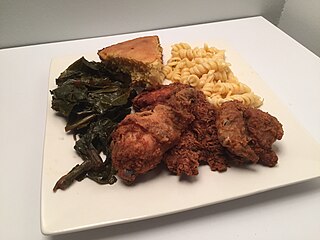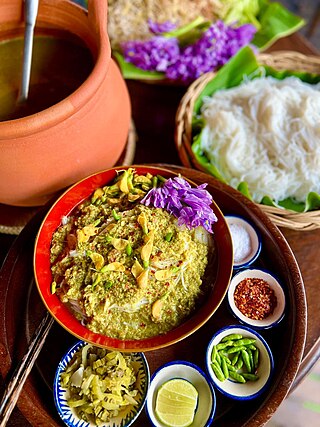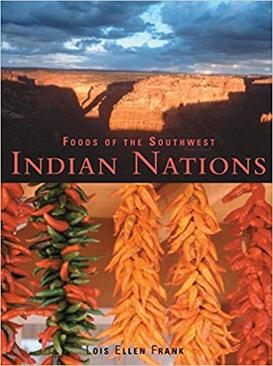
American cuisine consists of the cooking style and traditional dishes prepared in the United States. It has been significantly influenced by Europeans, Indigenous Americans, Africans, Latin Americans, Asians, Pacific Islanders, and many other cultures and traditions. Principal influences on American cuisine are European, Native American, soul food, regional heritages including Cajun, Louisiana Creole, Pennsylvania Dutch, Mormon foodways, Texan, Tex-Mex, New Mexican, and Tlingit, and the cuisines of immigrant groups such as Chinese American, Italian American, Jewish American, Greek American, and Mexican American. The large size of America and its long history of immigration have created an especially diverse cuisine that varies by region.

Soul food is the ethnic cuisine of African Americans. It originated in the American South from the cuisines of enslaved Africans trafficked to the North American colonies through the Atlantic slave trade during the Antebellum period and is closely associated the cuisine of the American South. The expression "soul food" originated in the mid-1960s when "soul" was a common word used to describe African-American culture. Soul food uses cooking techniques and ingredients from West African, Central African, Western European, and Indigenous cuisine of the Americas.

Pemmican is a mixture of tallow, dried meat, and sometimes dried berries. A calorie-rich food, it can be used as a key component in prepared meals or eaten raw. Historically, it was an important part of indigenous cuisine in certain parts of North America and it is still prepared today.

A cookbook or cookery book is a kitchen reference containing recipes.

Cambodian cuisine reflects the varied culinary traditions of different ethnic groups in Cambodia. Central to Cambodian cuisine is Khmer cuisine, the nearly-two-thousand-year-old culinary tradition of the majority Khmer people. Over centuries, Cambodian cuisine has incorporated elements of Indian, Chinese, French, and Portuguese cuisines. Due to some of these shared influences and mutual interaction, Cambodian cuisine has many similarities with the cuisines of Central Thailand, and Southern Vietnam and to a lesser extent also Central Vietnam, Northeastern Thailand and Laos.

Frybread is a dish of the indigenous people of North America that is a flat dough bread, fried or deep-fried in oil, shortening, or lard.

Indigenous cuisine of the Americas includes all cuisines and food practices of the Indigenous peoples of the Americas. Contemporary Native peoples retain a varied culture of traditional foods, along with the addition of some post-contact foods that have become customary and even iconic of present-day Indigenous American social gatherings. Foods like cornbread, turkey, cranberry, blueberry, hominy, and mush have been adopted into the cuisine of the broader United States population from Native American cultures.

Spoonbread is a moist cornmeal-based dish prevalent in parts of the Southern United States. While the basic recipe involves the same core ingredients as cornbread – namely cornmeal, milk, butter, and eggs – the mode of preparation creates a final product with a soft, rather than crumbly, texture. As the name implies, the consistency is soft enough that it needs to be served and eaten with a spoon.

The Oglala are one of the seven subtribes of the Lakota people who, along with the Dakota, make up the Očhéthi Šakówiŋ. A majority of the Oglala live on the Pine Ridge Indian Reservation in South Dakota, the eighth-largest Native American reservation in the United States.

Richard Blais is an American chef, television personality, restaurateur, and author. He appeared on the reality show cooking show Top Chef, and is known for his take on classic American cuisine. Blais was the runner-up for the fourth season of Top Chef and returned several seasons later to win Top Chef: All-Stars.

Heid E. Erdrich is a poet, editor, and writer. Erdrich is Ojibwe enrolled at Turtle Mountain.

Nadia Rui-chi Lim is a New Zealand celebrity chef, entrepreneur, food writer and television personality. Lim is known as the self-proclaimed "Nude Cook" as an advocate of natural, unprocessed foods, and for creating healthy, nutritious recipes by putting a health focus behind food, which is influenced by her background as a clinical dietitian.

Original Local: Indigenous Foods, Stories and Recipes from the Upper Midwest is a recipe/collage book written by Heid E. Erdrich, published by the MN Historical Society Press in Minneapolis, Minnesota. Heid E. Sherman is a member of the North Dakota Turtle Mountain Band of the Ojibwe people who is currently based in South Minneapolis. Her cookbook explores native american cuisine and indigenous ingredients, within a globally-aware framework that includes stories, recollections and anecdotes.
Indigenous cuisine is a type of cuisine that is based on the preparation of cooking recipes with products obtained from native species of a specific area.

Sean Sherman is an Oglala Lakota Sioux chef, cookbook author, forager, and promoter of indigenous cuisine. Sherman founded the indigenous food education business and caterer The Sioux Chef and cofounded with then-partner Dana Thompson the nonprofit North American Traditional Indigenous Food Systems (NĀTIFS). He received a James Beard Foundation Leadership Award and his 2017 cookbook, The Sioux Chef's Indigenous Kitchen, won the 2018 James Beard Award for Best American Cookbook. In 2022 the restaurant he co-owned with Thompson, Owamni, won the James Beard Award for Best New Restaurant.

Lois Ellen Frank is an American food historian, cookbook author, culinary anthropologist, and educator. She won a 2003 James Beard Foundation Award for her cookbook Foods of the Southwest Indian Nations, the first cookbook of Native American cuisine so honored.

Foods of the Southwest Indian Nations is a 2002 cookbook by Lois Ellen Frank, food historian, cookbook author, photographer, and culinary anthropologist. The book won a 2003 James Beard award, the first Native American cuisine cookbook so honored. CNN called it "the first Native American cookbook to turn the heads of James Beard Foundation award judges".
Brian Yazzie, known as Yazzie the Chef is a Navajo chef. He celebrates and promotes Indigenous American foods.

Owamni by the Sioux Chef, or simply Owamni, is a Native American restaurant in downtown Minneapolis, Minnesota, that overlooks the Mississippi River. Owamni's majority Native American staff serves a menu made from indigenous ingredients such as game meats, corn, and wild plants. The restaurant does not serve ingredients that were introduced to the region by Europeans, including butter, dairy, sugar, black pepper, wheat, chicken, beef, and pork.

Dana Thompson is an American restaurateur, songwriter, and promoter of indigenous cuisine and food sovereignty. In 2022 her Minneapolis, Minnesota, restaurant Owamni won the James Beard Award for Best New Restaurant.


















